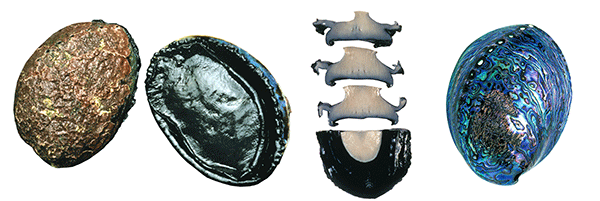
About pāua
Other name: abalone
Scientific names: Haliotis iris, Haliotis australis
Pāua are large sea snails that are highly valued by Māori, recreational fishers, and the commercial fishing industry. Pāua have always been a food source for Māori and play a significant role in manaakitanga ki ngā manuhiri (hosting of visitors).
Blackfoot pāua (Haliotis iris) are the most commonly found and caught species. Yellow-foot pāua (Haliotis australis) are only caught in small numbers.
Pāua:
- live in shallow waters (generally less than 10 metres) off the coast of New Zealand
- have a very small home range and can form large groups in suitable areas
- reproduce by releasing large amounts of spawn that are carried by currents to new locations.
Successful spawning is related to the number and size of groups. This makes it important to leave some pāua to breed for the next generation. Habitat like reefs and seaweed are important for settlement of their young.
Fishing rules for pāua
There are minimum legal sizes for harvesting pāua and bag limits.
Find out pāua fishing rules and guidelines
Pāua status and how we manage their numbers
Pāua are managed under New Zealand's Quota Management System (QMS), with 12 quota management areas. Under the QMS, annual catch limits and allowances are set differently for each area depending on population size, the health of the stock, and to ensure fishing pressure is at sustainable levels.
To find information about catch allowances and stock status for various areas, see the pāua section in Volume 2 of the Fisheries Assessment Plenary. This publication summarises all available information on fisheries and the status of each fish stock.
See the latest Fisheries Assessment Plenary

Report poaching
You can report poaching, suspicious, or illegal activity online:
Report illegal fishing (such as poaching)
You can also:
- call 0800 4 POACHER (0800 47 62 24), or
- email poacher@mpi.govt.nz
You can help us by providing:
- the location
- vehicle/trailer registration number
- boat name
- description of the person
When reporting any suspected poaching, put your personal safety first. All calls and personal details are treated as confidential.
Who to contact
If you have questions about pāua, email info@mpi.govt.nz








